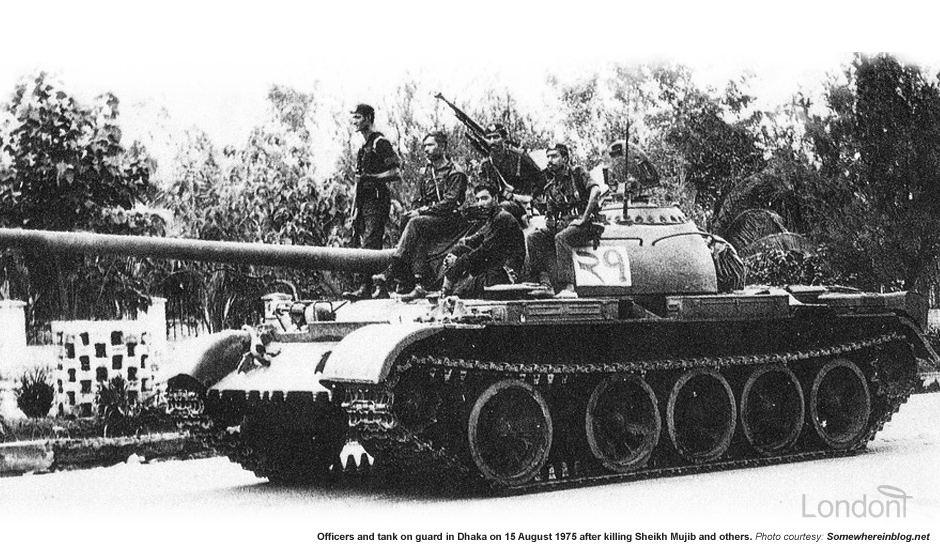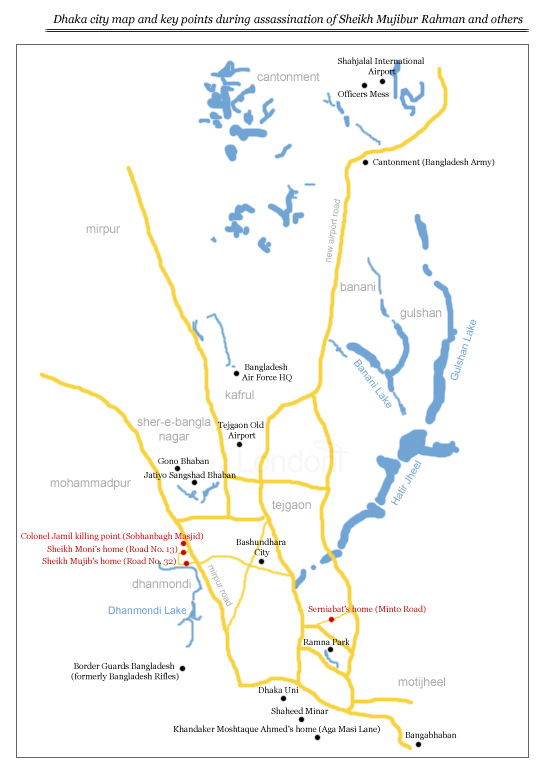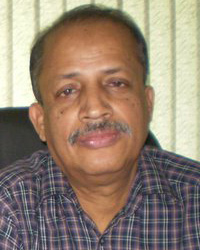
15 August 1975: Rebel officers march towards massacre early morning
Incredibly these massive preparations were made just 300 yards from the GHQ Field Intelligence Unit which was supposed to operate round the clock. As a precaution Farook had posted sentries outside its barbed wire fencing with orders to grab anyone who might venture out to investigate. No one did. Apparently the routine normality of the tanks' night training exercises had disarmed everyone.
Half an hour later as the column moved out with Farook in the lead tank he heard the 'Azan', the Muslim call to prayer, wafted on the heavy monsoon air by the loudspeakes of the Cantonment mosque. The undulating call was sweet music to his ears. He had been born on Friday at the time of the Azan. Now on another Friday with the Azan once more ringing in his ears he would either start a new life - or he would die. Again he repeated the Surahs that Andha Hafiz had given. Then he waved his killer teams forward and breaking out of line they sped off on their deadly mission.

Farook's bluff destablises 3,000 Rakkhi Bahinis
Farook was supremely confident of achieving his principal targets. The three teams had been instructed to proceed expeditiously, 'wiping out anything en route' that tried to stop them. Even if the officers failed, he knew his Lancer boys would not. So he kept for himself the most difficult and dicey part of the whole operation - the containment of the Rakkhi Bahini.
In normal circumstances, and given the element of surprise, it would not have been very difficult for 28 tanks to neutralise 3,000 men of the Rakkhi Bahini grouped in a single compound near the new Assembly Building. But the hard fact was that Farook's tanks were totally unarmed and sitting ducks for anyone who decided to stand up and fight. They did not have a single round of ammunition between them. Even the machine guns could not be operated. All tank ammunition, he said, was locked away safely in the Ordinance Depot at Joydevpur. Sheikh Mujib, who in the first place did not want to accept the gift tanks from Egypt, had tried to make certain that they would never be used against him. Farook, however, had other ideas - and he was banking on an incredible bluff to pull it off.
Few people really understand how effective the tank is as a psychological weapon. When you see one coming towards you it takes a really brave man not to run away. We knew our tanks were unarmed. Not more than a handful of men in GHQ shared this knowledge but they could not be absolutely sure about it. So as far as everybody else was concerned the tanks were very lethal and ready to blast anything that moved. [Laughs] Who would have thought I would be so mad as to take on the Rakkhi Bahini and GHQ with a string of unarmed tanks!.
I did not expect that everybody would had common knowledge that we didn't have ammunition. I thought, it would be just a knowledge to a few important people that the tanks didn't have ammunition... I mean it was of game of sheer bluff.
What Faruque has done could be compared with gambling. He had used 28 tanks to commit this brutal murder but none of the tanks had any ammunition.
Golam Murshid, writer
Farook's only stop on the way out of the Cantonment was the Ammunition Sub-Depot. He had a sneaking suspicion that he might find some tank ammunition or at least some bullet belts for the machine guns stored there. So he swung his tank into the compound and with its gun bashed the door down. A quick search revealed nothing he could use. Now the only weapon he had available to him was the sten gun resting across his knees. The bluff would have to work!
The tank column drove slowly down Banani Road, turned right and proceeded towards the Cantonment check point. On the way it passed a group of men in white shorts and singlets. They were troops of the 4th and 1st Bengal Infantry on their morning P. T. The men interrupted their drill to wave to the tanks. Faoork's men smugly waved back. Incredibly the large tank column outside its normal area had not aroused suspicion. The only person to take notice was Farook's father. Dr. Rahman, who had just finished his morning prayers, looked out of the window as the tanks went by. He thought it odd that they should be out and that too so early. And he wondered where they were going.
Once clear of the Cantonment area, the tanks surged forward, crashing through the airport wall. One tank broke off to control the runway, another to the helipad where half a dozen helicopters were parked. Nothing was going to land or take off from Dhaka airport. The other tanks sung round the Plant Protection Centre and raced the fields towards the Rakkhi Bahini headquarters. Farook looked at his watch. It was 5.15am. The killer teams should be on target.
On reaching the perimeter wall of the airport Farook discovered there was only one tank following him. Somehow he had lost the other 24. Undaunted he charged ahead. Crashing through the compound wall, he knocked down two trees and swung round the Rakkhi Bahini barracks. What he saw took his breath away.
Suddenly I found the brigade of 3,000 Rakkhi Bahini lined up six rows deep. They were battle equipped - steel helmets, rifles, packs, everything. There was no backing out after that.
The driver said, "What am I supposed to do?"
I told him, you just drive past them 6 inches from their noses. I ordered the gunner to keep the gun pointed straight at them. I told the other chaps in the turret to look brave.
As we slowly drove past them the Rakkhi Bahini kept looking at us. We kept looking back at them. It was a tense moment. I told the driver if they start anything just steer right and run over them.
It was not necessary. They could hear gunfire in the distance and here suddenly were the tanks. No one moved a finger.
Farook recalls the tense encounter with Jatiyo Rakkhi Bahini
Once a troop does not react normally, it takes them quite sometime to react again. As far as I was concerned, psychologically I was sure that they were not going immediately to react. They would, you know, start studying the situation, and once somebody starts studying situation, they didn't take any action.
Since the Rakkhi Bahini had not reacted instantly and attacked the tanks, Farook was certain they would stay put. Once more his assessment was tellingly accurate. Supremely confident that he had won the day Farook left the other tank to menace Mujib's storm troops and drove on to Dhanmondi.
Sheikh Mujib learns about attack on brother-in-law Serniabat's house
Sheikh Mujib's personal assistant, AFM Mohitul Islam, was on night duty when suddenly the phone rang in his office room. It was Sheikh Mujib on the other end asking him to call the police immediately. Sheikh Mujib had heard his brother-in-law Abdur Rab Serniabat's house at 27 Minto Road was being attacked.
 AFM Mohitul Islam ( - ) Sheikh Mujib's personal assistant. Witnessed the murder of Sheikh Mujib and family by Bazlul Huda and Nur Chowdhury.
AFM Mohitul Islam ( - ) Sheikh Mujib's personal assistant. Witnessed the murder of Sheikh Mujib and family by Bazlul Huda and Nur Chowdhury.
Mohitul - who lived to tell the tale - tried calling the police, but the line did not get through. When he called the Ganobhaban telephone exchange, somebody picked up the phone on the other end but said nothing. Irritated by lack of response, Sheikh Mujib snatched the phone from Mohitul and shouted into the mouthpiece.
This is President Sheikh Mujib speaking!
Sheikh Mujib thundered down the phone
Inside Mohitul's office, Sheikh Mujib stepped beside a table and pulled Mohitul to the ground in order to avoid the bullets which were raining in. Right then house help Abdul brought Sheikh Mujib's white panjabi (kurta) and glasses from the first floor. The president quickly put them on and came out into the veranda.
There have been firings all around. What are you doing?
Sheikh Mujib shouted at his sentries (watchmen)
Sheikh Mujib went off to the upper floor where his wife Begum Fajilutunessa Mujib, sons Russell and Jamal, daughter-in-law Parvin Jamal 'Rosy', and brother Sheikh Abu Naser were sleeping. He did not realise this would be his last meeting with his family.
